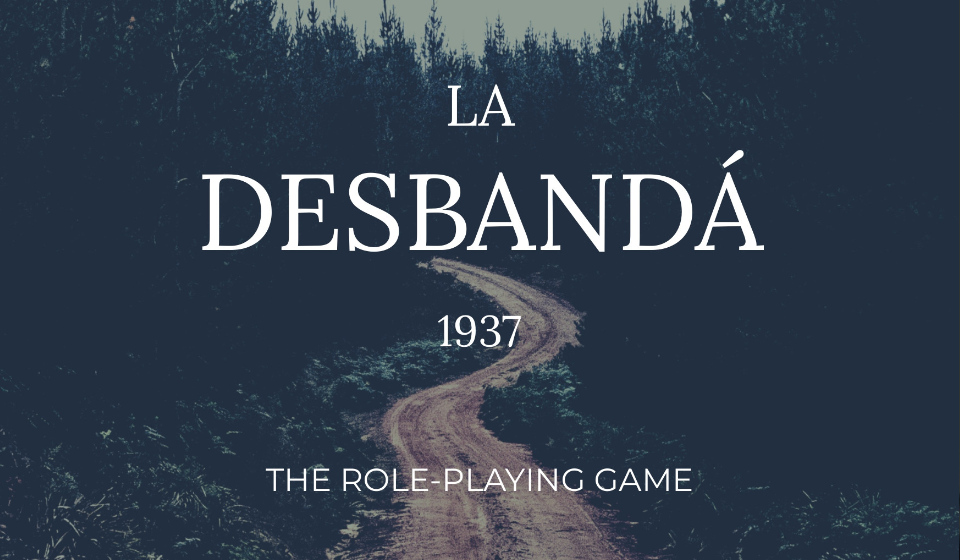This post has Conflicts of Interest Online editor Andrew Bucholtz interviewing game designer Pablo López about his La Desbandá 1937 role-playing game, which puts players in the shoes of survivors navigating a massacre of civilians during the Spanish Civil War. The game is available for free as a digital download, or at cost for a printed version. The interview, which was conducted over e-mail, follows below.
Andrew Bucholtz: What’s your background in games, either playing and/or designing? How much experience do you have with games about history in particular? What about with role-playing games?
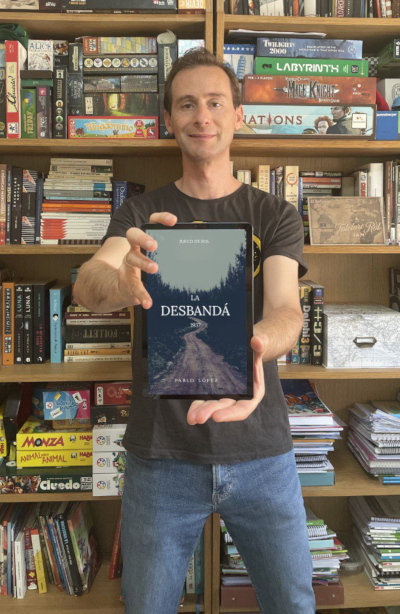
Designer Pablo López with a copy of “La Desbandá 1937.”
Pablo López: Since childhood, I have been a passionate gamer, enjoying a variety of games such as video games, board games, and role-playing games. These hobbies have stayed with me into adulthood, and I am fortunate to share them with my children. While I always had a curiosity for game creation, it wasn’t until recently, thanks to role-playing games, that I could truly fulfill that desire.
My introduction to role-playing games happened almost by accident at the age of 12 when my brother and I received Runequest instead of Heroquest for Christmas. It was a significant discovery for us, as it opened up a world of imagination and fantasy. After adolescence, I stopped playing role-playing games until recently, when I returned to playing online due to the COVID situation.
My passion for history developed relatively recently. I had always favored technological themes until I started to become curious about history, particularly the Spanish Civil War, a topic that has often been avoided in Spain. Since then, I have gradually cultivated an interest in history, initially through reading. This interest soon extended to leisure activities, including playing some wargames (Labyrinth: The War on Terror is one of my favorites), and naturally, it is something I always try to incorporate into role-playing games, both as a game master and in my designs.
This passion for history coincided with my return to role-playing games during the COVID pandemic. I realized that unlike video games and board games, role-playing games allow me to express and convey ideas and concepts without requiring significant resources. As a result, I began creating role-playing game content, primarily with historical backgrounds.
AB: What inspired you to make La Desbandá 1937? Why was this particular moment in the Spanish Civil War notable for you to spotlight?
PL: The game La Desbandá 1937 is quite peculiar. It is based on a massacre of the same name, la desbandá, which, despite being perhaps the largest civilian massacre of the entire civil war, had been forgotten until the early 21st century. When I first read about this event, I was struck by the fact that despite its geographical proximity, I had never heard anything about what had happened. This led me to decide that it was worth telling this story in some way to other people.
Furthermore, the fact that the lives of thousands of people converge in that event at the same place and time is significant. This is somewhat akin to what happens in role-playing games: the stories of various characters come together under a single event, which led me to believe that it would be a good medium to tell this story.
Behind this creation is also the idea that if movies like Schindler’s List and games like This War of Mine can help bring awareness to stories similar to that of la desbandá, a role-playing game is also a valuable tool for this type of dissemination.
AB: In an earlier discussion, you talked about the game offering “a unique approach to understanding historical events through immersive storytelling.” What are the advantages of learning about a moment like this through a role-playing game? What does the RPG format bring to history?
PL: The game La Desbandá 1937 offers a unique approach to understanding historical events through immersive storytelling by focusing on the experiences of civilians involuntarily caught up in the conflict and trying to survive, rather than solely emphasizing combat aspects typical of war-themed games.
Role-playing games allow players to become firsthand protagonists in the story, enabling them to explore events freely from their own perspectives. This immersive experience fosters intimate empathy with the history and its characters, enhancing the learning process significantly.
Moreover, La Desbandá 1937 aims to address the lack of role-playing games based on the Spanish Civil War. Until now, there had been no role-playing game that historically explored this conflict, making this game a valuable addition to the genre and offering a new perspective on this significant historical event.
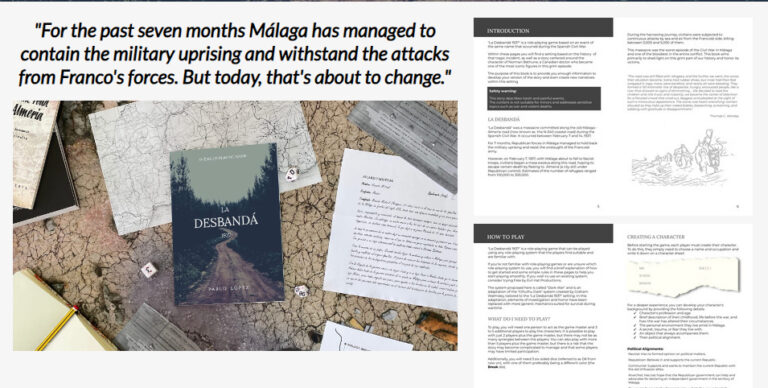
An image from the “La Desbandá 1937” website.
AB: I found it particularly interesting how you incorporated historical characters such as Norman Bethune and Gerda Taro for the players to interact with. What was behind that decision?
PL: The decision to incorporate historical characters like Norman Bethune and Gerda Taro into La Desbandá 1937 was driven by specific reasons. In the case of Norman Bethune and his team, they were unique witnesses to the events of la desbandá, and their documentation efforts ensured that the tragedy did not fade into obscurity. Therefore, using the story of this doctor and his team as a central thread for the role-playing game was a way to honor their crucial role in preserving the memory of la desbandá.
Regarding other characters like Gerda Taro, including her in the game serves to give them the recognition that history may have overlooked. Gerda, who shared the famous pseudonym Robert Capa with her partner Endre Ernő Friedman, was somewhat forgotten after her death in Madrid during the Civil War. Today, the credit for the photos is often attributed solely to Friedman, which is seen as unjust. By incorporating Gerda Taro into the game and highlighting her story, it was a way to address this historical oversight and bring attention to her significant contributions.
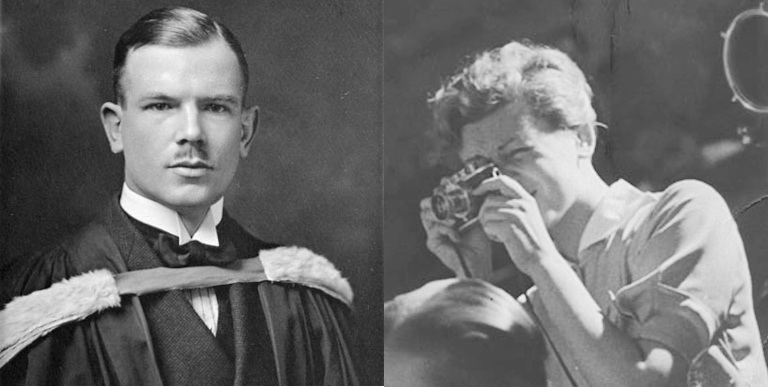
Norman Bethune at his 1916 graduation and Gerda Taro in Guadalajara in 1937. (Images from Library and Archives Canada/icp.org, via Wikipedia.)
AB: I appreciated that you provided not just the historical material contained in the game, but also links to newspaper archives and maps of the area. Why was it important for you to do that?
PL: Incorporating real maps and newspapers into La Desbandá 1937 serves multiple purposes. Firstly, it enhances the immersion of the players in the game sessions. The use of authentic maps and newspaper archives helps create a more realistic and immersive experience, allowing players to feel deeply connected to the historical context of the story being played out. This heightened sense of realism can significantly increase the players’ immersion in the game and make the narrative more engaging.
Furthermore, real newspapers, in particular, can serve as sources of inspiration for game masters to create new adventures, characters, or events within the game. By drawing from the content of historical newspapers, game masters can enrich the storytelling experience, introduce new plot elements, and add depth to the overall gameplay. The incorporation of these real-world elements not only adds authenticity to the game but also provides a wealth of potential story ideas and details for game masters to explore and integrate into the gameplay.
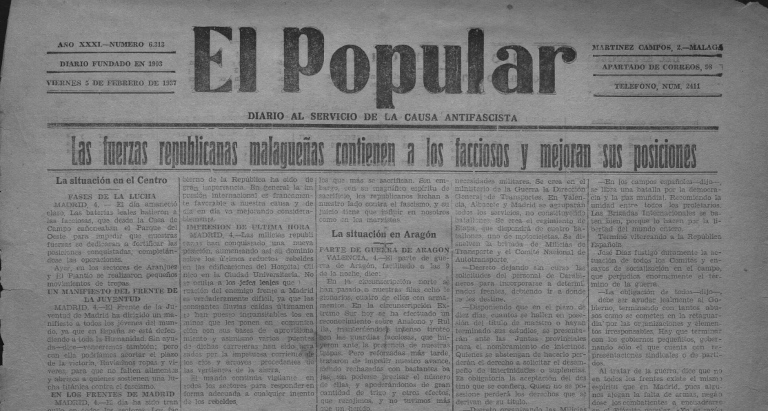
A copy of “El Popular” from Feb. 5, 1937. (Biblioteca Virtual de la Provincia de Málaga.)
AB: Why was the Cthulhu Dark system the right fit to adapt for the system provided with this game? It has some interesting ideas such as even low rolls succeeding, but with challenges, and high rolls succeeding too much, plus the idea of growing insanity reduced by suppressing mythos knowledge (which you adapted to break and reconciliation); why did those mechanics fit here?
PL: The decision to adapt the Cthulhu Dark system for La Desbandá 1937 was driven by several key factors. Initially, La Desbandá 1937 started as a small generic module designed to be played with any system, which garnered significant interest not only from role-playing game enthusiasts but also from the general public. However, the general audience lacked experience in playing role-playing games, leading to the need for a simpler game system that could cater to a broader audience.
Cthulhu Dark was chosen as the basis for the adapted system due to its simplicity and strong narrative potential. Despite its straightforward mechanics, Cthulhu Dark offers a robust storytelling framework. After careful analysis, it was determined that with minor modifications, the system could be effectively tailored to fit the setting of La Desbandá 1937.
The mechanics of Cthulhu Dark, such as the concept of succeeding even with low rolls and the idea of success leading to consequences, aligned well with the thematic elements of La Desbandá 1937. In the game, the focus lies not solely on whether players achieve their goals but on how they achieve them and the repercussions of their actions. Every advancement in the story, no matter how positive, carries a toll on the characters, reflecting the harsh realities of the setting. Therefore, the mechanics of Cthulhu Dark seamlessly complemented the themes and gameplay dynamics of La Desbandá 1937.
Additionally, the mechanic in Cthulhu Dark that allows characters to sacrifice knowledge to regain sanity resonated with the storytelling approach of the game. The practice of creating reflective moments or introspections for players between scenes or days in La Desbandá 1937 aligned perfectly with this rule, providing players with opportunities to delve into their characters’ inner struggles and decisions within the context of the game.
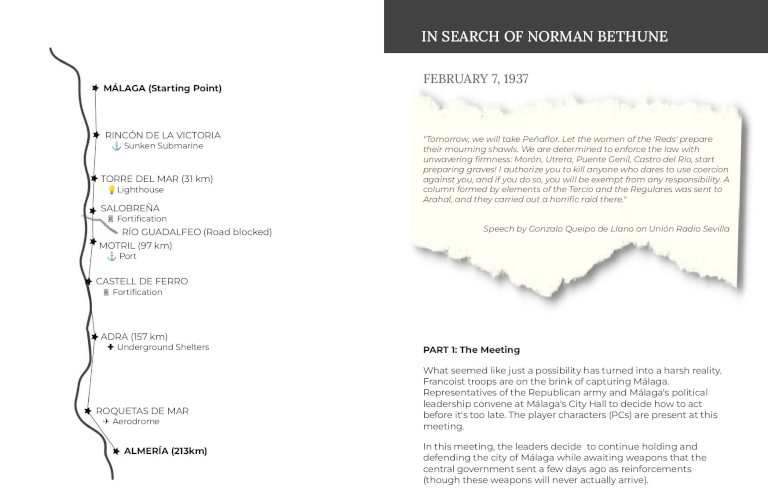
Two pages from “La Desbandá 1937,” showing the area covered and describing the setting.
AB: You note that this game could be played with any role-playing system. Why is that important, and are there other systems you think would work well here?
PL: The flexibility of being able to play La Desbandá 1937 with any role-playing system is crucial as it allows for accessibility and inclusivity, catering to a wide range of players with varying levels of experience and preferences. Initially designed as a generic module, the game later incorporated a simple set of rules to enable anyone to play without requiring extensive preparation or prior knowledge of specific systems. However, the game’s underlying depth and adaptability make it suitable for translation into more complex rule sets, offering players the opportunity to tailor the experience to their preferences.
One system that I particularly enjoy using for this game is FATE. FATE‘s mechanics allow players to explore deeper into their relationships with each other and the game world, fostering a narrative that evolves from the historical backdrop of la desbandá into the personal stories of the characters. This transition transforms the gameplay into an intimate and profound experience, where the players’ interactions and decisions shape the unfolding narrative.
AB: How long did it take you to get this game from idea to completion? In particular, what kinds of research did you do?
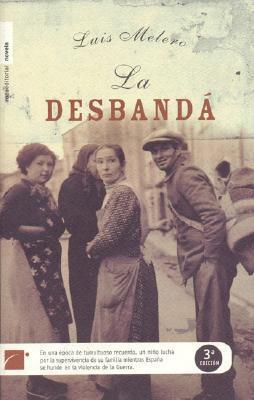
The novel “La desbandá,” by Luis Meloro. (Goodreads.)
PL: The development process of La Desbandá 1937 was a slow and gradual journey, starting with the initial intention to create a game based on the historical event of la desbandá without a clear direction. Extensive research played a crucial role in shaping the game, with the following key sources consulted:
- The book Carretera Málaga-Almería by Jesús Majada, a historian renowned for his work on la desbandá
- An military atlas of the Spanish Civil War to understand the military operations around Málaga, Granada, and Almería.
- Norman Bethune’s book, The crime on the road Malaga – Almeria, from which a facsimile edition was used.
- A photography book on the Spanish Civil War.
- Video interviews with survivors of the massacre.
- The novel La Desbandá by Luis Melero, who popularized the term.
After immersing in the research material and gaining a comprehensive understanding of the historical event, the process of translating it into a role-playing game began to take shape. The initial draft was crafted as a generic module, which received positive feedback and motivated further refinement until the game reached its current form.
Overall, the development of La Desbandá 1937 took approximately a year and a half to complete. It’s important to note that this project was pursued as a hobby, with time dedicated as availability allowed, contributing to the meticulous and thoughtful creation of the game.
AB: It’s very cool that you made this available for a free download or a low-cost printed version. Why did you go that way rather than a traditional publishing route?
PL: I decided to make La Desbandá 1937 available for free download or at a low cost because I had a very clear purpose from the beginning. In Spain, there is an association called La Desbandá that annually retraces the refugees’ journey from Málaga to Almería to honor the victims and raise awareness about the tragic events. I wanted to align with their mission by honoring the victims and sharing the story of la desbandá through the game.
My goal was not driven by profit but by a desire to contribute to society, much like the selfless efforts of the association.
For the English edition, I chose a more traditional publishing route to ensure a polished version in a language I am not fully proficient in and to reach a wider audience in an unfamiliar English speaking context.
Given the unique blend of role-playing, educational gaming, history, and wargaming in the game, finding a traditional publisher willing to take on such a project was challenging. Fortunately, the Dietz Foundation supported the English edition by covering the expenses for a professional English editor, resulting in a high-quality publication that could reach a broader audience and fulfill the game’s mission of honoring the victims and sharing this important historical event with others.
AB: Why was it important to you to get this game translated into different languages? What was that process like?
PL: As I mentioned before, one of the purposes behind the creation of La Desbandá 1937 is to shed light on the events it is based on. To provide some context, the bombing of Guernica is widely known internationally, largely due to Pablo Picasso’s work Guernica. However, the number of victims in la desbandá is nearly 10 times greater than that bombing, involving the harrowing escape over days of hundreds of thousands of people. Yet, until recently, it was scarcely known in Spain, and even less so internationally.
Driven by the positive reception of the Spanish version, my awareness of the international significance of the Spanish Civil War, and inspired by numerous works that have brought other massacres to the world through film, books, etc., I set out to internationalize the game.
I am proficient in English, so I undertook the initial translation. Subsequently, as I mentioned earlier, I approached the Dietz Foundation, who loved the game. They generously offered to handle the editing process pro bono.
There is now also a French version thanks to an indie role-playing creator named Doc Dandy who also volunteered to do it for free.
It is truly heartwarming to see people not only enjoy and appreciate the game but also join the project, enabling it to reach an ever-growing audience.
AB: What do you hope players take away from La Desbandá 1937?
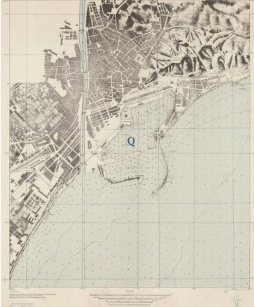
A 1937 U.S. Army service map of Málaga. (University of Alabama.)
PL: First and foremost, I hope that players discover what happened to the hundreds of thousands of people who had to flee from Málaga under bombardment more than 80 years ago during the Spanish Civil War.
I also aim to raise awareness of the importance of understanding and remembering the past to comprehend the present and avoid repeating the same mistakes in the future, as well as to honor the victims who endured all these injustices.
Furthermore, I would like people to change their perception of games and understand that they can be serious and powerful tools to achieve purposes beyond mere child’s play.
Beyond that, I simply hope that players use the historical aspect of this game to travel back in time and experience, each in their own way, those seven days of escape.
AB: What’s next for you? Do you have any other game designs in the works?
PL: At the moment, I am primarily focused on projects related to La Desbandá 1937, such as working on the French edition and organizing a role-playing game event tied to the annual commemorative march by the La Desbandá association. These endeavors have been occupying my time in recent weeks as I strive to expand the reach of the game into educational settings and beyond the traditional gaming table.
As for future game designs, my creative process typically begins when a particular theme captures my interest. While I am currently immersed in La Desbandá-related activities, I am also in the process of exploring new themes and ideas that may lead to the development of new game designs. I am always open to new inspirations and opportunities that come my way, and I look forward to getting involved into new projects as they unfold.
Pablo López resides in Spain, where he works as a software developer by profession. Beyond his professional pursuits, he finds immense joy in crafting role-playing games. He’s an avid enthusiast of technology, history, art, and gaming in all its forms, including video games, board games, and of course, tabletop role-playing games. His journey into game design stemmed from a deep-seated interest in history and real-world events, which he weaves intricately into his creations. With each project, he aims to not only entertain but also enlighten and immerse players in captivating worlds of storytelling and exploration.
Thanks to Pablo for his time! You can check out La Desbandá 1937 for free here, and follow him on Twitter here.
